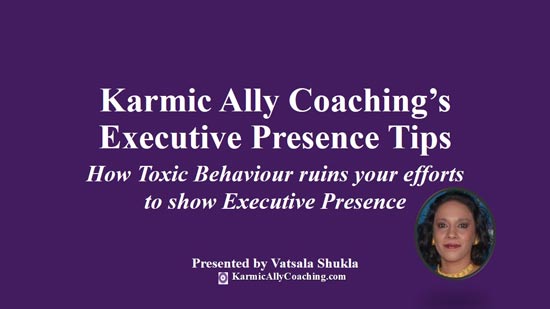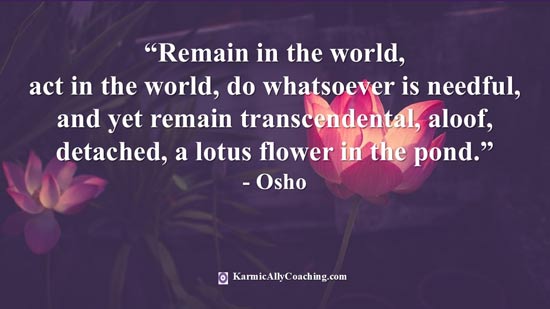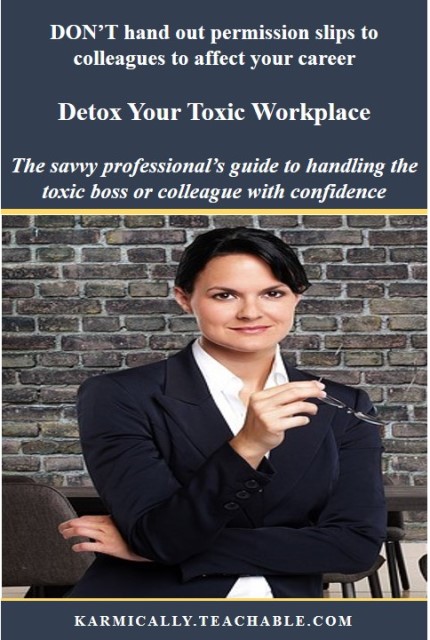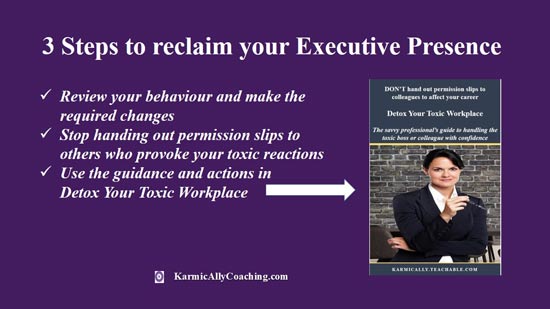This post has already been read 963 times!

Every professional worth his or her salt knows that demonstrating Executive Presence is important for their career, especially if they are aiming at a Leadership position.
But what about toxic behaviour? Did you know that toxic behaviour can actually ruin your efforts to show Executive Presence?
Resources mentioned in video blog
Blog Post: How to Peacefully Handle Toxic People with Grace
Free Emotional Intelligence Traits Checklist
Course: Detox Your Toxic Workplace (click here or on the image below for details)
Update April 2024: This course is now available at Karmic Ally Coaching’s Success Solutions
Prefer reading about how Toxic behaviour ruins our Executive Presence? Transcript below:
Hi, I’m Vatsala Shukla, Chief Encouragement Officer at Karmic Ally Coaching and in this presentation, I want to discuss toxic behaviour and its impact on Executive Presence.
The topic came about while I was preparing my micro course on handling toxic workplace culture. And then it struck me that, what if, we ourselves are the toxic person in question.
But first things first, let’s have a look at something else.
And that is, a question about, what does executive presence mean to you?
Now the reason I’m asking this is I’m not looking for a textbook explanation or something you may have read in an article, but what does it actually mean to you?
And that it can mean different things to different people and it is quite a difficult concept to explain at times.
When I asked a couple of people what Executive Presence meant to them, I came up with a couple of answers and the 5 main ones were that they wanted to walk into a room and command attention.
In other words, command the place.
They wanted to be charming enough compared to others to compete with others for a prestigious promotion.
They wanted to demonstrate gravitas and wow people even if they didn’t know how to make it work. Or they wanted to impress with their expertise.
But most of them felt the following two. And that is, they wanted, desired more respect and they wanted to have their voice, recommendations and ideas heard and to be taken more seriously.
So that is fine. They understood what Executive Presence is.
But where do we go wrong in understanding Executive Presence?
It’s all about how you come across to others & present yourself.
Basically, Executive Presence is a soft skillset, it’s a behaviour or competency that a professional can develop provided they’re willing to put in consistent practice.
In other words, it’s not just for a presentation or for a meeting, but it has to be done consistently throughout.
And most importantly, it’s not about you!
It is about how those who you are presenting before or working with experience you. So, I also noticed there are certain behaviours which show that you do not have Executive Presence or that you are lacking in it which are also quite similar to toxic behaviour.
The 3 that I have identified are, that you speak too much and you dominate the conversation. Now it could be that you are eager to impress and you don’t realize that your behaviour may be seen as lacking Executive Presence.
You struggle to moderate your emotions or struggle to adjust to others’ emotions. In other words, your emotional intelligence is low.
And much worse, you are prone to outbursts and emotional outbursts will definitely make sure that nobody considers you for the next position.
Now here’s a short case study of my own
If you remember, in my blog post on How to Peacefully Handle Toxic People with Grace, I spoke about a new boss who had come in, who wanted his own team and he set about making sure that those of us who were still there had a hard time.
He wasn’t in the mood to fire but he definitely wanted us out.
And, apart from being a bully, his actions actually ruined the ambiance in the department and all of us who had been working quite well with each other suddenly became backstabbers and because our team actually interacted with people outside of the department, their activities were noticed by everyone.
Suddenly all of us started to lose what we had as Executive Presence.
The question is, how did we become so toxic?
The truth is we became fixated with the wishes of the boss.
We were under psychological distress and our organization didn’t bother to either acknowledge or address the powerful communicator and we continued that way.
Instead of focusing on the mission of the organization we started focusing on what the boss wanted so that we wouldn’t get targeted by this boss, who made sure that the targeting was done in open space.
Everything became urgent. In other words, we stopped looking at tasks or prioritizing them, looking at urgent and not urgent.
The Covey quadrant went out of the window, everything was urgent and our patience threshold started to decrease which meant we were all snappy at each other and cranky.
And we drove each other to exhaustion but we didn’t reach out for help because by that time we were completely intimidated by the behaviour of the boss.
The truth is, that, no one is born toxic. But toxicity not only hurts the other person but it also takes away a lot from us.
According to experts, stress and undue pressure inculcates this toxic side in people, who more often than not are not even aware of their toxic behaviours.
Maybe that was the situation with our boss also who had been brought in to achieve a certain goal and he needed to deliver. So toxic behaviour could be situational.
Now, coming back to you, do you think you’re toxic?
Here are 9 signs that I’d like you to consider and see if any of them resonates with you.
Firstly, you criticize others for no rhyme or reason and you blame them for delays or lapses.
You squeal about others to your boss in order to earn brownie points.
And this is something that happened to me with that same toxic boss because one of my assistants was so scared of losing his job he started speaking ill about me to the boss who was more than happy to get notes on what all I was upto whether it was true or false.
You start to look for the negative in every situation or proposal and beat down people if they come up with an idea.
You talk more than using the skill of active listening and you end up micro-managing your team and keeping checks on them. In other words, you don’t really let them function.
You’re so scared, you’re so stressed out that you don’t want a mistake so you don’t let them do their work.
You tend to react aggressively when someone confronts you and you insult others in public instead of having private conversations behind closed doors. In other words, you hit at the other person’s self-respect and self-esteem.
And you simply need to have the last word in any conversation or disagreement. That is the power of being or becoming toxic. So my question to you is
Considering what I’ve spoken about earlier, are you lacking Executive Presence or are you toxic?
And if you feel you have become toxic,
Here are the 3 steps that I can suggest to reclaim your Executive Presence and reduce that toxic behaviour.
Firstly, start with reviewing your behaviour and making the changes required.
You’ve already got 9 signs of toxic behaviour. You’ve got 3 places where people lack Executive Presence and show toxicity. Make the required changes.
Secondly, stop handing out permission slips to others who provoke your toxic reactions because it could be that you’re responding to them in the wrong way.
And thirdly, use the guidance and actions that I’ve put in my new course Detox Your Toxic Workplace.
This course will show you exactly what is toxic behaviour. It will help you identify and manage toxic relationships, a toxic boss and also toxic colleagues.
On top of it, I’ve also included certain other resources that will help you to build your resilience so that you stop being toxic and start focusing more on demonstrating true Executive Presence. As a final word,
I’d like to leave you with this beautiful quote from Osho which I think sums up what you really need to do and that is to remain in the world, act in the world, do whatsoever is needful, and yet remain transcendental, aloof, detached, a lotus flower in the pond.

That’s all from me. This is Vatsala Shukla signing off. See you next time.





 I adhere to the Certified Coaches Alliance Code of Ethics and Standards. A copy is available on request.
I adhere to the Certified Coaches Alliance Code of Ethics and Standards. A copy is available on request.
 Let's Talk through the Connect Form:
Let's Talk through the Connect Form:
This is the most scientific analysis of toxic behaviour and executive presence that I have come across so far. It is really helpful to identify the cues and work on them. Thanks Vatsala for sharing your thoughts.
Thanks for the compliment, Koyelia. I often have a different perspective on issues which affect all of us. Finding the middle path is important especially when we ourselves might be contributing to the situation.